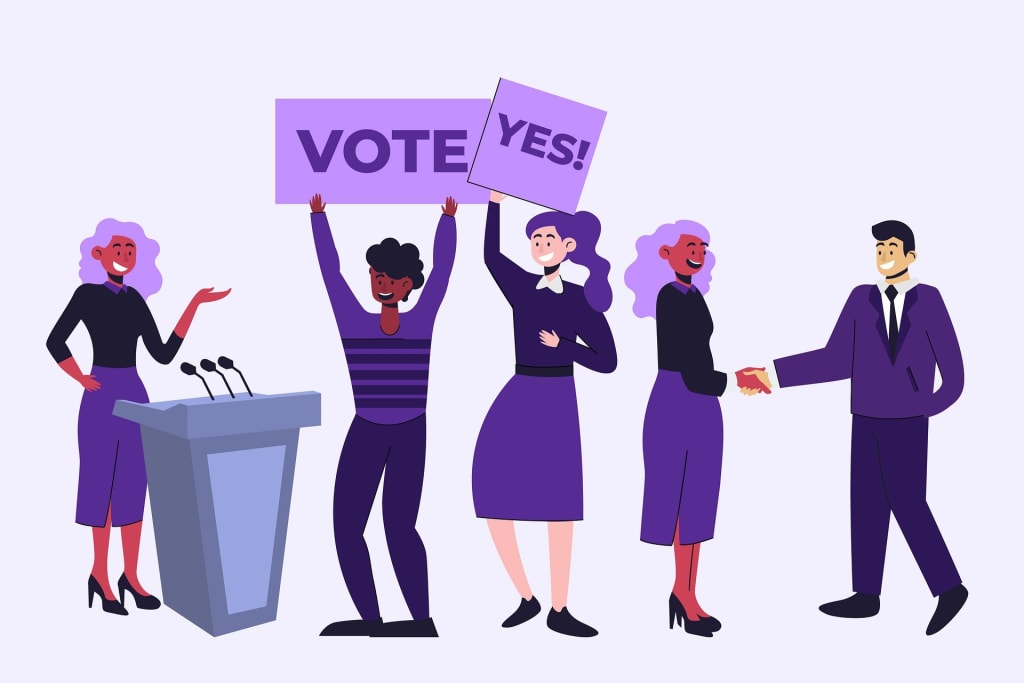So you voted, Now what do you Do?
a conversation about voting

All year I've witnessed people discuss voting and its importance. And all year I've rolled my eyes. Watching the millions of social media posts and commercials about how imperative voting is this year and how not voting is "voting as well". The conversation of the "lesser of two evils". and the overarching cataclysm that has been this two-party dominated system under the succubus of capitalism. Now that we are closing in on this election, and people have voted they seem to have some sort of confidence that they did the right thing.
There's a conversation that getting rid of Donald trump delivers some sort of heroic act that defeats a tyrant from office. As if The systems of racial and cis male oppression are going to wash away once we vote Joe Biden in.
( I know this isn't the truth, and the majority of the conversation deters from that, however, the energy reveals something different in my interpretation.)
there's the constant conversation of voting as if it is the end all be all, the absolute. And I believe that is why so many people choose not to vote
And that conjures up this ultimate question I've had for a while now.
What do you do after you vote?
so you've voted, what's next? What do you do after you vote? Yes, your vote counts, but it is not the ultimate action to change a system designed for failure. It is but a cog in the wheel that pushes the machine of justice. Once you vote, the job is far from finished. So the question stands, what do you do once you vote?
Here is a post informing you of some things you can do after you vote. In order to deconstruct the systems of capitalism, racism, sexism, etc.. we must continue the fight long after the election in a myriad of ways. Here is a list detailing some steps that can lead to action to suppress the systems that bind us in my own opinion.
1. Lobby
Definition- seek to influence (a politician or public official) on an issue.
Lobby your local officials about issues that affect your community. Talk to your politicians, they're available. Find their schedules. Lobbying is important to keep a firm grip and grasp on what your politicians are doing to better the communities they represent. Find local lobbying associations or justice networks that lobby and get involved.
Here are a couple of videos that explain lobbying
https://www.youtube.com/watch?v=aTbtKRdYbYo
granted Lobbying when in the wrong hands can be detrimental. This has a lot to do with the fact that it is a 3.5 billion dollar industry overran by retired politicians mostly lobbying for big companies and whatnot. However, this shouldn't deter you from lobbying at all.
https://www.youtube.com/watch?v=FZVfTCBUkgM
Lobbying also is defined differently by state, "The definition of a lobbyist typically revolves around lobbying on behalf of another for compensation"
How do you lobby?
It's not an easy task however it isn't difficult either. find local lobbying organizations by researching them. find what lobbyists work for your interests and get involved. Check out this lobbying site, see what you can find.
2. Work within your community
Your community is important. Your community is the goal. It takes a village. Find organizations or like-minded people that do community work and assist them. This can be anything from teaching the youth to community cleanups and speak-outs, being a part of community centers, etc.
In any given community there are speak-outs and organizations designated to assisting the community. Food drives, backpack giveaways, after school programs. It takes a village. working in community organizations, building the community, and working within the community is imperative for the success of our communities.
Civic engagement, volunteering, starting your own grassroots, collaborating with other organizations, these are all means of assisting the communities you live in.
3. Hold you politicians accountable
You voted them in, you can vote them out. If you've lobbied your politicians and they don't hold up their end of the bargain with your community you can hold them accountable.
Reasonably speaking.
Voting them out, signing petitions, speaking out.
It's imperative that we take advantage of our resources as communities and hold those elected officials accountable and remind them why we chose them as leaders. They are the voices of our desires, not overlords that control our well being. the evidence is in the elections. In the most recent election, Donald Trump was voted out due to an overwhelming dislike to be modest for who he was as president.
There is power in holding politicians accountable and eliminating them from office if they don't respect the people.se your power, hold your politicians accountable.
4. Learn your rights
Learn the constitution, learn your city rights, learn your state's rights. Abide by them. Find the loopholes in them. Understand their purpose to serve you and your people. Know your rights so that you can defend yourself against the law if it attempts to subdue you.
There are plenty of sites that reveal laws that you may have not known, laws that you may be breaking subconsciously, laws that keep you from unlawful arrests.
5. Develop relationships with officers/ doctors etc
this one looks counterproductive yes. Our community servants should be knowing us, they should build rapport with us. However, it does take two to tango. this isn't our responsibility to build these relationships, however, it is our burden. And if we wish to not carry the burden alone then we must reach out to these officials. Servants of the law, doctors, lawyers, firefighters.
Know the police force in your community. Know your doctors. Make them build relationships with the people in your community. Yes, it sounds exhausting and takes up energy, however, it is necessary to build that trust and create the change we see fit.
6. Establish connections within your community
As I've said before, it takes a village. We must know our neighbors. We must know the people around us and learn how to build long-standing relationships with them. If our neighbors know each other they are more likely to protect each other from potential threats.
seek out clubs like girls Inc. and boys and girls clubs and build relationships there. Learn your community outreach centers. Find local businesses to build rapports with. These are the steps necessary to build within your communities and grow.
7. Teach the youth
the youth are the future. their decisions when they grow will determine the way our worlds work. it is important that they are taught the proper ideals and delivered the proper tools for the country's success. there are many youth centers and organizations that can excel with the proper people in them.
become a tutor or a teacher, these all can help kids. there are so many ways to get involved with the youth. starting your own youth group can help as well.
Understanding your role outside of voting can help make your vote count. When we realize that it is on us to build our communities and not the reliance solely on politicians, then we can begin to thrive. When we begin to hold ourselves and our politicians accountable, work outside our comfort zones, and build within our communities we will open the floodgates to our progress.
About the Creator
Adonis Richards
An aspiring writer and journalist looking to motivate people through my writing and poetry






Comments
There are no comments for this story
Be the first to respond and start the conversation.